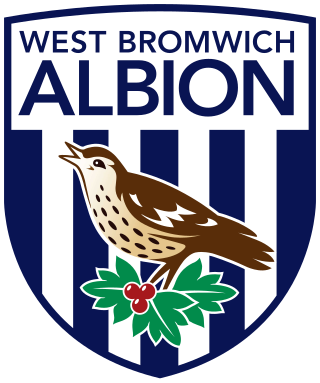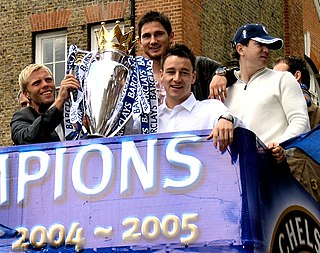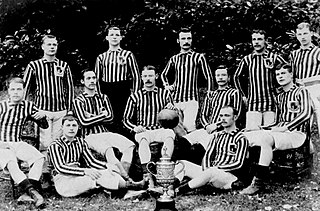
West Bromwich Albion Football Club is a professional association football club based in West Bromwich, West Midlands, England. It competes in the EFL Championship, the second level of the English football league system. The club was formed in 1878 and has played at its home ground, The Hawthorns, since 1900.

The 2004–05 FA Premier League was the 13th season of the Premier League. It began on 14 August 2004 and ended on 15 May 2005. Arsenal were the defending champions after going unbeaten the previous season. Chelsea won the title with a then record 95 points, which was previously set by Manchester United in the 1993–94 season, and later surpassed by Manchester City in the 2017–18 season (100), securing the title with a 2–0 win at the Reebok Stadium against Bolton Wanderers. Chelsea also broke a number of other records during their campaign, most notably breaking the record of most games won in a single Premier League campaign, securing 29 wins in the league in home and away matches, which was later surpassed by themselves in the 2016–17 season.

Liam Matthew Ridgewell is an English retired professional footballer who played as a defender. He was primarily a centre back but could also play at left back. He is currently an assistant coach with the Portland Timbers.

Luke Isaacc Moore is an English former professional footballer who played as a striker. Moore represented England at England U21 level and is the younger brother of former professional footballer Stefan Moore.
Birmingham St. George's F.C. was a football club based in Smethwick, England. The club started as St George's FC in Aston, before moving to the Cape Hill brewery in 1886 under the name Mitchell St George's.
West Bromwich Albion Football Club are an English football club based in West Bromwich. The club's history dates back to its formation in 1878 as West Bromwich Strollers by workers from Salter's Spring Works in West Bromwich. The team was renamed West Bromwich Albion in 1880. Albion have played their home games at The Hawthorns since 1900.
The Birmingham Senior Cup is a football competition for Birmingham County FA club teams, organised by the Birmingham County Football Association. It began in 1876 and is the oldest county cup competition still active.
The Black Country derby is the name given to any local derby between English football teams West Bromwich Albion, Walsall and Wolverhampton Wanderers. Though most commonly it refers specifically to games between West Bromwich Albion and Wolverhampton Wanderers due to Walsall spending most of their existence in lower divisions than the other two teams. All three clubs reside in Staffordshire’s historic boundaries, but they are separated 11 miles apart in the Black Country of the present-day West Midlands county.

The 1887 FA Cup final was a football match between Aston Villa and West Bromwich Albion at the Kennington Oval. It was the final of the sixteenth staging of the FA Cup which saw 124 teams compete for the final. The final was won by Aston Villa with goals coming from Archie Hunter and Hodgetts to give Aston Villa a 2–0 victory. This is Aston Villa’s first of 7 FA cups.
Section 5 are a football hooligan firm associated with Championship football club West Bromwich Albion F.C. Whilst Albion have had several other firms since the 1960s, including Clubhouse and the Smethwick Mob, Section 5 is the largest, with activity peaking in the 1980s and 1990s.
The 1880s was a decade that saw Aston Villa F.C. go from a small club to one that could challenge most teams in the country at the time. It also saw their most significant contribution to the game across the globe, with William McGregor creating the world's first Football League.
The 1953–54 season was the 55th season of competitive league football in the history of English football club Wolverhampton Wanderers. They played in the First Division, then the highest level of English football.
The 1886–87 season was the ninth season in the history of West Bromwich Albion Football Club. The club reached the FA Cup final for the second successive season, but again finished as runners-up, losing 0–2 to local rivals Aston Villa. Albion also reached the final of two regional cup competitions, winning the Staffordshire Senior Cup and finishing as runners-up in the Birmingham Senior Cup. In addition, they took part in the Walsall Senior Cup and Birmingham Charity Cup, as well as playing a number of friendly matches.
The 2011–12 Premier League season was Aston Villa's 137th season in English football. It was the club's 101st season in the top-flight; and their 24th consecutive season in the top flight of English football, the Premier League. The club was managed by former Birmingham boss Alex McLeish, following Gérard Houllier's departure on 1 June 2011 after less than a year in charge. An extremely disappointing season for the club, saw them finish in 16th place and only two points off relegation. Numerous records were broken during the season including: the lowest points total in the Premier League, fewest wins in a season (7) and worst home record in Villa's 138-year history. As well as poor performances in both domestic cups – being knocked out in the third round of the League Cup and the fourth round of the FA Cup – this season eventually culminated in the sacking of McLeish on 14 May 2012, a day after the season had concluded.
The 2019–20 Premier League Cup was the seventh edition of the competition. The defending champions were Everton, who won the 2018–19 competition. This edition of the tournament did not crown a champion as it was cancelled at the Round of 16 stage, due to the COVID-19 Pandemic in the United Kingdom.
During the 1985–86 English football season, Aston Villa competed in the Football League First Division.
The 2017–18 Premier League Cup was the fifth edition of the competition. The defending champions were Swansea City, who won the 2016–17 competition.
The 2018–19 Premier League Cup was the sixth edition of the competition. The defending champions were Aston Villa, who won the 2017–18 competition.
The 2022–23 Premier League Cup was the ninth edition of the competition. The defending champions were West Bromwich Albion, who defeated Wolverhampton Wanderers on penalties in the previous final. This season saw the return of a Under-21 age limit, reduced from Under-23 the previous season, with clubs permitted to use five over-age outfield players and an over-age goalkeeper in order to help with the transition.






